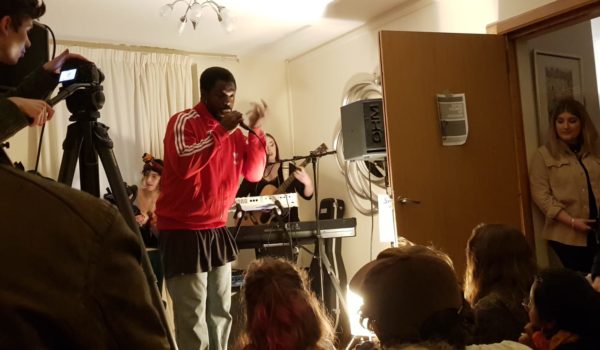Morgan continues using The Record as an outlet for his impotent rage, as the March lockdown didn’t satisfactorily isolate him from society.
Much like the weird smelly kid your mum forces you to be friends with, I tend to avoid Bioshock 2, and judging by the way the game constantly crashed every five minutes, the feeling was reciprocated. I’m fairly certain I ended up using the quick-save feature with more frequency than the movement buttons, but that may also have been because the game was lulling me into a trance so deep it would have taken a bulldozer through my wall to stir so much as a fluttering eyelid.
If Bioshock 2 was a standalone title, my overall opinion could be summarised as “nice setting, shame about the gameplay”, but the true misery comes into the picture when we are reminded of the fact that this is a sequel. Now that we’ve had a taste of the forbidden fruit of the first game, boasting the sweet juices of a nice setting and nice gameplay, the let-down of this instalment brings about the sense of betrayal one might similarly experience by being kicked in the goolies by their beloved horse. But if you’ve at some point murdered your family and are looking for the ideal form of penance, I’m sure I have enough space to give you an overview.
The plot is a stagnant mess focusing on a Big Daddy (who, despite being supposedly a prototype, walks faster, shoots faster and can take experimental drugs like it’s crunch time at the methamphetamine factory), who is enjoying a normal day of trudging aimlessly around the steampunk hellscape of Rapture before his Little Sister companion is taken from him and he is hypnotised into shooting himself by the villain.
“And then” the game babbles excitedly, frothing at the mouth with excitement and failing to notice that it’s soiling its trousers in the process, “the Little Sister, who is now just a Regular-Sized-Sister, can telepathically communicate with you and tell you to – “
I’m going to stop you right there, Bioshock 2. The “being-hypnotised-into-shooting-ourselves” thing I can overlook, since this is one of the Plasmids (power-ups, if you’re just joining us) you can use in-game. But telepathic communication? Not only are this duo implied to be powerful enough to conquer the universe in a way that would put the likes of Emperor Palpatine to shame, but the question of how or why is not once addressed.
Then again, maybe it was addressed, I wouldn’t know. Once the gameplay kicked off with a weak splutter and shuddering cough, I was fighting to stay awake by the half-hour mark. Fetch quest after fetch quest after fetch quest, separated by a single train cart-type-thing to transport you to the next loading screen just to hammer home the repetition. From the slew of endless monologues the villain likes to throw at you, I gathered that your Little Sister is supposedly the up-and-coming Messiah of a potential communist utopia. I’m assuming that 2K Studios didn’t want to alienate the ultra-capitalists in the audience after last time and decided to focus on the opposite end of the spectrum. Never mind the fact that this underwater city has already been bent forward over a concrete traffic barrier and given a good dystopian seeing-to: so long as your evil plan relies on the basic philosophy of “well it turned out horribly for the last sinister, stupid person, but I think their problem was that they just weren’t sinister or stupid enough”, then go for it, I suppose.
I’ll give Bioshock 2 one thing: it certainly grants me a higher level of appreciation for the background characters of the first game. Once they’re taken away and replaced with the one-note sock puppets we have now, it becomes clear how necessary they are for you to be immersed in the game’s world as a whole. And by the end of this, you’d sooner be immersing yourself in a septic tank full of raw sewage. Your NPC companion over the radio sounds like Bugs Bunny after a week in Texas and the villain, a stock morally-corrupt scientist lady, seems to have no other plans for you other than to overshare her master scheme and bore you to death. Even your Little-but-not-really-Sister, who may I remind you we are supposed to play through this tosh for, has no real personality besides occasionally sending you a care package or ringing you via your psychic hotline. Wah, I’ve been kidnapped and am being forced to live under a matronly figure who knows what she’s doing, instead of a lumbering gorilla in a deep-sea diver’s suit. Whinge, whinge, whinge.
The only new characters that affect the gameplay in any way are the Big Sisters, just in case these names aren’t confusing enough for you yet. The game spawns them in as mini boss fights whenever you become dangerously close to enjoying yourself, mainly as a way to drain your health and ammunition so the regular enemies you encounter in the next room aren’t completely underpowered. But the rock up my exhaust pipe is how they factor into the moral choice system.
Get this: as with the first game, you’re pressured into either rescuing or harvesting Little Sisters, often as part of a mission. But both choices carry an equal chance of a Big Sister showing up! Surely it would make more sense for her to get all sensitive about things if I chose the bad option and pulled the Little Sister’s spine out, Mortal Kombat-style. I guess my selfless rescuing fills her with so much inhuman rage that she simply can’t hold back.
And so we reach the end of the review. This would be the point where a shit reviewer would say “If you liked the first game, you’ll like this because it’s basically more of it!”, but I don’t think that idea works in practice. Yes, if you played the first game, you’d settle back in quickly: you’ve got a rivet gun and a raging murder boner, there’s a few hundred roomfuls of enemies who aren’t yet choking on their own blood, that sort of thing. But the eternal paradox of copying what people liked the first time around is that whilst the initial enjoyment fades over time, the bad or irritating features become more prominent and hang around festering. And the few problems I had with the first Bioshock remain unimproved; you can still use the same two plasmids without consequence for the whole game and you can focus on the audio tapes for maybe ten seconds into your first gunfight, before throwing your hands up and getting right back to turning the atmosphere into ninety-percent lead.
It’s just all so lacking in entertainment value. After all, you’re just going through the same motions as the bloke in the first game, except this time you’ve got a goldfish bowl on your head.








Comments